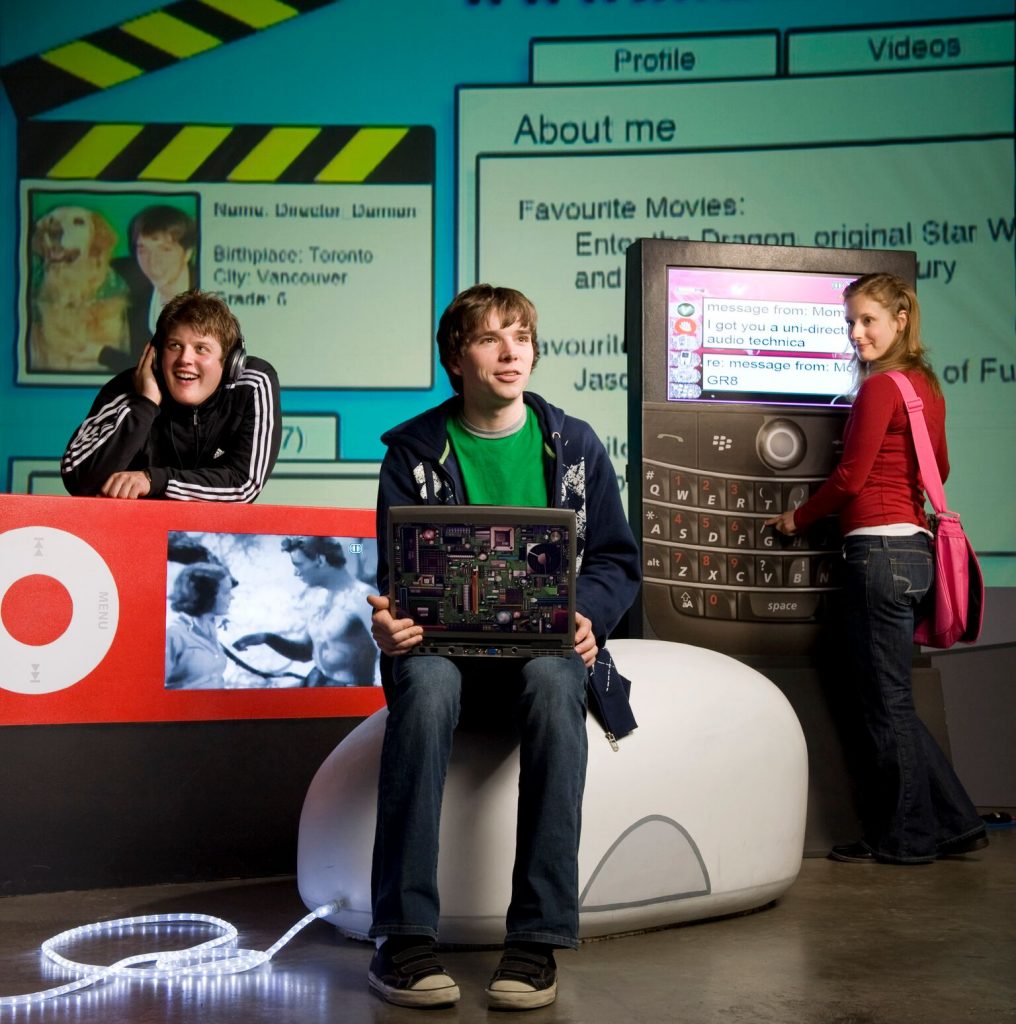Deep learning happens when students see their stories being re-enacted on stage, as relationships are negotiated, emotions unpacked, situations played out, and prejudices unveiled. This process of being both inside and outside a lived experience provides opportunities for students to activate a sometimes-silenced voice. When it comes to sharing their fears, frustrations and worries about issues that affect them every day, students are often reluctant to speak out for fear of being judged and misunderstood. Teachers are challenged with finding modes to unlock student concerns as they negotiate their multiple roles: educator, facilitator, parent, counselor, nurse, mentor and role model.

Wired by Betty Quan. (l-r) Gord Myren, Graham Newmarch, Susan Coodin. Photo by David Cooper
A common theme in each of these roles is the desire to assist students in “storying” their lives and struggles, to make space for life lessons to occur and to facilitate healthy dialogue. Opening up these often-muffled voices is a challenging undertaking for teachers as they walk the fine line between listening and lecturing. Educators wish to guide students in making healthy choices and to assist them in articulating their needs in an effective manner. How do we best amplify students’ voices and promote discussion that will positively shape their lives? As an aesthetic educator, I would argue that the best way to get to know our students on an emotional level is to tap into the affective domain through the arts, and specifically, through drama.
Celebrating 35 Years of Green Thumb Theatre
Giving voice to young peoples’ issues, worries, thoughts and feelings through the performance of plays is at the forefront of Green Thumb Theatre’s mission statement:
Green Thumb Theatre creates and produces plays that explore social issues relevant to the lives of children, youth and young adults. We provide theatre that celebrates the language and stories of today’s generation and culture to stimulate empathy, debate and critical thinking.
A professional company entering it 35th season, Green Thumb has been a conduit for the aforementioned difficult conversations. Through scripts with strong messages on issues that affect today’s youth, spoken in their language, students are able to discover alternate pathways of action and are given tools by which to confront challenging situations. Using rap to teach about the ills of crystal meth addiction, chat rooms as a way to expose on-line bullying, and “gibberish” language to explore the difficulties of immigrant students, Green Thumb utilizes the emotional impact of live performance to educate and empower young people by challenging them to re-examine their beliefs and prejudices and to define their feelings and aspirations.
Green Thumb Theatre was founded in 1975 to develop original Canadian plays for young audiences. Since that time, Green Thumb has emerged as one of Canada’s leading theatre companies for young people, producing excellent material for audiences and artists, and contributing to the growing body of work evolving in this field. Green Thumb demonstrates a new excitement and potential for children’s theatre.
Green Thumb evokes a critical response from its audience and opens up reflective thought processes through its “talk back” sharing sessions held at the end of each show. This bridging from performance to personal facilitates the sharing of reaction and reflection, which often creates space for classroom discussion and thought-filled dialogue. In this way, theatre effectively teaches without preaching and delivers messages that not only give voice to student experiences but amplifies student voice inviting them to story and re-story their lives.
Acting not only as a catalyst for intrapersonal reflection and interpersonal discussion, Green Thumb’s plays serve as a method to integrate learning into curriculum. The performances carry forward the messages expressed into the classroom- learning context through the incorporation of Study Guides, in which the teacher is provided with an additional tool to reflect on the learning. The Study Guides engage the students in thematic learning in Language Arts, Fine Arts, Social Studies and Personal Planning, to name a few. The lessons provide opportunities for students to make connections inside and outside the four walls of the classroom. Many of the lessons are framed around researching social issues, role-playing difficult situations, and writing critically about how to solve problems. Through these experiences, students are provided with multiple landscapes for learning and opportunities for participatory discovery of knowledge. In this way, the study guides serve to promote student creativity; critical thinking and problem solving; collaboration and communication; empathy and understanding; and personal agency.
Further promoting life-wide learning, parents are often provided with handouts that inform them about issues that are confronting their children, and outline strategies to assist them in handling the challenges that children and youth face. Learning through the dramatic medium in this way serves to educate and empower students, teachers and parents, and facilitates a shared responsibility for young peoples’ intellectual, social and emotional health and wellbeing. Amplifying student voice utilizing their language, experiences and expressions, Green Thumb meets students where they are at and moves them towards richer understandings of self and other.
In recognition of Green Thumb Theatre’s 35th Anniversary Season, Green Thumb would like to hear from you how your students have been transformed by a Green Thumb play. Please email your stories to info@greenthumb.bc.ca.
Green Thumb website: http://www.greenthumb.bc.ca/
ABOUT THE AUTHOR
Paula Rosehart
Paula Rosehart is a member of the Green Thumb Theatre Board of Directors and Faculty Associate, Simon Fraser University.
This article is from Canadian Teacher Magazine’s May 2009 issue.












